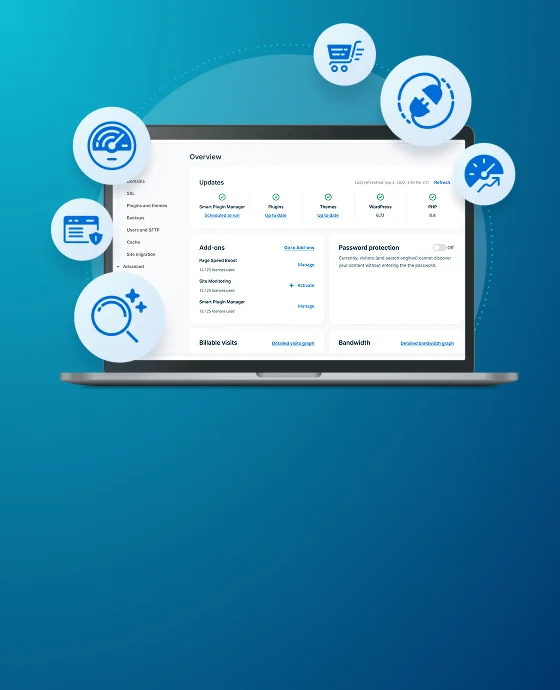
eCommerce Platform Comparison: What’s The Right Solution For Me?
Aside from having the best digital products, an increase in demand for convenience and accessibility within online shopping has led to cutthroat competition among eCommerce platforms. In a market full of awesome eCommerce solutions, it can be a daunting task to choose the best one for your business.
To help cut through the noise, we’ve broken down the most popular platforms for you. Exploring each solution’s key features, pros, cons, and pricing can help you make an informed decision for your enterprise-level or small business.
In this article, we’ll review five of the most popular eCommerce platforms. Let’s dive right in!
Comparing Top eCommerce Platforms: Your Comprehensive Guide
It’s no secret that it’s a great time to be in eCommerce. However, the platforms available are not one-size-fits-all. Each platform comes with its own strengths and weaknesses, based on the size, sophistication, and ideal functionality for your business.
This means that whether you’re a small business taking a hands-on approach, or a larger business that needs to delegate tasks, there’s an eCommerce platform for you. There are a number of elements to consider when choosing your solution, including:
- Customization options
- Scalability
- User-friendliness
- Affordability
- Mobile accessibility
- User experience
- Different payment gateway options
You’ll also want to make sure the popular eCommerce platform you choose can handle your projected customer volume.
Seeing all of your choices side-by-side can be helpful:
While price is likely to be high on your list of decision-making factors, it’s important to make sure you’re getting the features you need as well.
Comparing Top eCommerce Platforms: An In-depth Analysis
Although the market is saturated with eCommerce solutions, not all of them are up to the task. Let’s look at five of the most popular platforms that are worth considering, including:
- BigCommerce
- Shopify
- Magento
- WooCommerce
- Volusion
There’s a lot of information to cover, so let’s start from the top.
1. BigCommerce
BigCommerce is one of the most popular eCommerce software solutions for small-to-medium sized businesses. Its dashboard is noticeably straightforward and easy-to-use, making it a favorable choice for users.
This eCommerce platform is top-rated for its Search Engine Optimization (SEO) features. Additionally, BigCommerce ranks well when you look at the options for personalization, and its reliability. The platform is equipped with seven free themes and 84 paid themes, ranging from $145 to $243 per month.
If you want a full-fledged store with a ton of plugins, add-ons, and integration options for Content Management Systems (CMSs) like WordPress, BigCommerce is your go-to solution. In fact, BigCommerce for WordPress was created in partnership with our teams here at WP Engine, so you can count on its solid programming and WordPress know-how.
While this is the most expensive of the five options we will discuss, it does come equipped with tools that will help you build your site fast, freeing up your time and resources to devote elsewhere.
Pros:
- Lots of eCommerce features out of the box
- Fully hosted
- Easily scalable
Cons:
- Only seven free themes
- Price lockdown forces you into an Enterprise account if your income exceeds a certain amount
- Lacks robust content management
Notable brands using the BigCommerce Enterprise plan include Paul Mitchell, Camelbak, and Native Union.
BigCommerce for Small Business
Starting at $29.99 per month, BigCommerce has lots of features. A standard pricing plan with BigCommerce comes with a number of sales channels, and is rich in options.
These include a responsive website, single-page checkout, Apple Pay, reporting tools, HTTPS, and more. While it lacks powerful content management capabilities, you can easily integrate BigCommerce with a CMS like WordPress, in order to reap the benefits of both content and commerce.
BigCommerce for Enterprise
As we mentioned in the previous section, you will be required to have an Enterprise-level plan if your revenue is above a certain amount.
Enterprise plans range from $900 to $1,500 per month. One noteworthy feature included in this plan is the one-page checkout option, which can aid in increasing conversion rates.
2. Shopify
Shopify is perhaps the most well-rounded of the eCommerce platforms. It has it all when it comes to easy setup and a user-friendly dashboard.
In terms of popularity, Shopify is the perhaps the biggest platform out there for small, medium, and large businesses alike. If you are looking for the widest variety of apps, add-ons, and plugins, then Shopify is a great choice for your online shop.
Pros:
- Very budget-friendly starter plan
- Professional themes
- Has a variety of apps and add-ons to extend the eCommerce functionality
Cons:
- Limited customizations
- A higher price point for the enterprise level plans
- Transaction fees for certain Shopify payment gateways
Shopify is worth looking into if you don’t want a hosted, all-in-one eCommerce solution, and are happy to trade a lower price for a few limitations.
Shopify for Small Business
Thanks to its simplicity and ease of use, Shopify is ideal for small businesses. It’s also affordable, with Shopify Lite starting as low as $9 per month. Plus, Shopify’s themes are abundant, stylish, and professional.
Smaller inventories will benefit from the features and the top-rated support on offer. Although Shopify lacks powerful blogging and content-creation capabilities, it can easily be integrated with CMSs like WordPress by using a plugin.
Shopify for Enterprise
If budget is not an issue, and you are solely looking for a place to sell products with little to no technical involvement, the fully-hosted SaaS Shopify Plus is worth checking out.
For enterprise businesses, this means lower opportunity costs; especially if you’d rather spend money on marketing and product development and not on testing servers.
Shopify Plus also offers superior account management, amazing technical support, and tons of agile marketing tools. In addition, the interface is very easy to navigate for front-end users. Although the eCommerce platform is flexible on the front end, there are back-end limitations that limit customizability.
Shopify Plus starts at around $2,000 per month, with some additional costs depending on the add-ons you choose. Some notable enterprise-level customers are LakersStore, Hershel, and Tesla.
3. Magento
Magento is an open-source platform offering maximum flexibility, as well as third-party integration. It comes with an abundance of features other platforms are missing, including multiple locations, sites, languages, and currencies.
Magento Commerce also happens to be very scalable, and is well-suited to growing your small or enterprise business into a thriving online store.
Pros:
- Feature-packed
- Works with multiple languages and currencies
- No transaction fees on the small business plan
- Lots of plan options
Cons:
- The Magento enterprise solution is not open source
- The platform doesn’t have a lot of content creation options
- There’s something of a steep learning curve
Magento for Small Business
For businesses that prefer a simple online store, Magento Go is Magento’s most basic plan. Ideal for small retail shops, this version includes a very simple user interface.You’ll also get a highly-developed knowledge base, high-quality product management, and no transaction fees.
This plan has just one service fee per month. Ultimately, Magento Go offers a very basic experience for an ideal starter price. It starts at $15 per month for 200MB of storage space and 100 SKUs, and ends at $125 per month for 5GB of space and 10,000 SKUs. Some notable Magento Go customers are Arrive Chic and Off the Hook.
For those seeking something in between Magento Go and Magento Enterprise, Magento Community is another option. It is free to use, with paid extensions available. You’ll get mobile integration, plenty of themes, and multi-store functionality.
Magento Community will best serve retailers with high traffic and a large inventory. It’s ideal for mid-sized to upper retailers. With Magento Community, retailers can achieve an enterprise-level eCommerce website and a sophisticated experience at a lower cost. Some notable Magento Community customers are The Discovery Store and The Watch Gallery.
Magento for Enterprise
Magento’s enterprise solution is a self-hosted platform, meaning it needs to be modified at the core level in order to incorporate additional features and functionality. This makes Magento a very malleable, customizable platform if you have the resources and time available.
This platform is truly everything you might want out of an eCommerce solution. It comes equipped with PCI compliance, tax calculation features, return management modules, loyalty programs, email marketing, and more.
While the dashboard can be a little tricky to navigate, it offers plenty of beneficial features such as the ability to list and add product attributes. Magento Enterprise is primarily geared towards retailers who want the all-in, hands-off package.
Some downfalls include the fact Magento Enterprise does not have a built-in blog, and isn’t open source. It is also pricey, starting at around $20,000 annually. Current Magento Enterprise clients include Nike, Tivo, and OfficeDepot.
4. WooCommerce
WooCommerce is the most popular WordPress-specific eCommerce plugin. Perhaps its most attractive feature is that it is completely free and open source.
The platform is also easily customizable, and the WordPress community offers endless support. Plus, WooCommerce is regularly updated and very secure.
Pros:
- Free and open-source
- Highly customizable
- Integrates with many other platforms and payment gateways
- Lots of support
Cons:
- Created for WordPress, so you’ll need a WordPress website
- Requires extensions for larger-scale product inventories
- Extensions can be expensive
WooCommerce for Small Business
As we mentioned, WooCommerce is free to download and easy to set up, making it ideal for any businesses using a WordPress website. The interface is modern and intuitive and lets you create a beautiful experience using professional, mobile-friendly themes.
Plenty of add-ons such as Instagram integration, table rate shipping, and wholesale pricing can be purchased to add new features to your storefront. This is by far one of the best options for small businesses, due to its affordability and the ease of content creation with WordPress.
WooCommerce for Enterprise
If you have an enterprise-level business that already uses WordPress, WooCommerce might be perfect for you.
However, if you have a lot of products, you’ll need to import a bulk product extension, which costs around $200. This solution is simple and straightforward, but if you are an enterprise-level company you might consider opting for a digital experience platform so your site can scale up as needed.
5. Volusion
Volusion enables you to focus on selling products, and lets you leave the technical tasks, such as maintaining servers and back-end programming, to them.
Volusion also has over 350 eCommerce template design options. This includes some that are very mobile-friendly, and 82 that are free to use.
Pros:
- A fully-managed system
- Administrate from a mobile app
- No additional transaction fees
Cons:
- Limited storage space
- Not suited for companies with expansive product listings
- Complicated pricing tiers with separate pricing for each feature
Volusion for Small Business
One of the oldest open-source eCommerce solutions on the market, Volusion offers a very reliable and comprehensive experience. For a business just getting off the ground, its Mini plan allows for 100 products, includes 1GB of bandwidth, and only costs $15 per month.
For those who are generating more revenue, there are the Plus and Pro plans for 1,000 to 10,000 products and 3 to 10 GB of bandwidth. These plans are $35 and $75 per month respectively. If you are looking for a simple and clean online store with few products, Volusion is worth a look.
Volusion for Enterprise
Due to the limited storage space offered by Volusion, this particular platform might not be ideal for huge companies. Exceeding the storage space offered results in high fees, which is not ideal for a large, enterprise-level business.
Of course, Volusion is highly customizable and jam-packed with features. There are five different plans suitable for many different-sized businesses. At the top of the tiers, the premium plan starts at $135 per month.
Comparing Top eCommerce Platforms: Enhance Your WordPress Experience with WP Engine
So which is the best eCommerce platform? That depends on the nature of your small or large business. Regardless of what you choose, you can integrate any of these eCommerce softwares with any website builder. Before making the final eCommerce platform selection, you need to pick the right web hosting package.
At WP Engine, we are proud to host a number of eCommerce sites. We combine a dedicated work environment with a toolkit for WooCommerce integration. Additionally, our digital experience platform will provide your business with SEO-ready performance, improved mobile experiences, and reliable security.
You’ll also have access to third-party integrations for WordPress and all of the most popular eCommerce platforms. WP Engine’s WooCommerce Hosting solution is ideal for your eCommerce store because it is built for speed, is easily scalable, and provides simple staging so you can test your store before launching.
eCommerce sites using our platform experience three times more cart additions, a 50 percent reduction in page loading times, and three times more checkouts. We have various WordPress hosting plans for any sized business. Or you can check out our enterprise WordPress hosting solution, and give your business a competitive edge!


